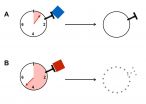Counting the seconds for immunological tolerance
2014-10-02
(Press-News.org) Our immune system must distinguish between self and foreign and in order to fight infections without damaging the body's own cells at the same time. The immune system is loyal to cells in the body, but how this works is not fully understood. Researchers in the Departments of Biomedicine and Nephrology at the University Hospital and the University of Basel have discovered that the immune system uses a molecular biological clock to target intolerant T cells during their maturation process. These recent findings have been reported in the scientific journal Cell.
A functioning immune system is tolerant towards the body's own tissue. During maturation, immune cells are targeted and eliminated if they have a strong reaction to the body's own substances. This process is a fundamental topic of immunology research. If intolerant T cells survive this selection process when they should have been eliminated, this can lead to an autoimmune disease such as multiple sclerosis, diabetes or rheumatoid arthritis.
Self-Tolerance Depends on Negative Selection
An article appearing in the latest edition of the journal Cell discusses how immunological self-tolerance develops. The article was published by the research group led by Professor Ed Palmer and first author Ondrej Stepanek from the Department of Biomedicine at the University Hospital and the University of Basel along with researchers from Cambridge (USA) and Cardiff (UK).
During their maturation process, T cells in the thymus undergo various tests requiring T cell's antigen receptor to bind the body's own molecules. If the antigen receptor binds a body molecule too tightly, the developing T cell might eventually cause an autoimmune disease; in this case negative selection is triggered, and the cell dies. Only those T cells that exhibit "loyal" behavior towards a person's own body continue the maturation process, to become pathogen-fighting T cells.
Dwell Time as the Missing Link
The negative selection of maturing T cells is essential for the immune system to function properly. In the current study, the authors describe the mechanism that controls the negative selection process. Based on their own experiments, they developed a mathematical model describing the molecular events underlying negative selection. The key feature is the dwell time, during which a maturing T cell binds to one of the body's molecules. The dwell time is measured by a molecular biological chronometer. If the process exceeds four seconds, the maturing T cell is eliminated through cell death; if it is less than four seconds, the cells continue to mature because they passed the "loyalty" test.
For Palmer, who states that "this question has fascinated me for a long time," the findings of this study are the fruits of his nearly 35 years of research in this field. "Immunological tolerance was discovered more than 60 years ago." explains the immunologist. "Although this seems like a big step in understanding an essential part of tolerance, there are things we still don't know such as how the immune system compensates for mistakes made during negative selection."
INFORMATION:
[Attachments] See images for this press release:

ELSE PRESS RELEASES FROM THIS DATE:
2014-10-02
It's an early lesson in genetics: we get half our DNA from Mom, half from Dad.
But that straightforward explanation does not account for a process that sometimes occurs when cells divide. Called gene conversion, the copy of a gene from Mom can replace the one from Dad, or vice versa, making the two copies identical.
In a new study published in the American Journal of Human Genetics, University of Pennsylvania researchers Joseph Lachance and Sarah A. Tishkoff investigated this process in the context of the evolution of human populations. They found that a bias toward ...
2014-10-02
Scientists love acronyms.
In the quest to solve cancer's mysteries, they come in handy when describing tongue-twisting processes and pathways that somehow allow tumors to form and thrive. Two examples are ERK (extracellular-signal-related kinase) and JNK (c-June N-Terminal Kinase), enzymes that may offer unexpected solutions for treating some endometrial and colon cancers.
A study led by Gordon Mills, M.D., Ph.D., professor and chair of Systems Biology at The University of Texas MD Anderson Cancer Center with Lydia Cheung, Ph.D. as the first author, points to cellular ...
2014-10-02
Television sitcoms in which characters make jokes at someone else's expense are no laughing matter for older adults, according to a University of Akron researcher.
Jennifer Tehan Stanley, an assistant professor of psychology, studied how young, middle-aged and older adults reacted to so-called "aggressive humor"—the kind that is a staple on shows like The Office.
By showing clips from The Office and other sitcoms (Golden Girls, Mr. Bean, Curb Your Enthusiasm) to adults of varying ages, she and colleagues at two other universities found that young and middle-aged adults ...
2014-10-02
AUDIO:
Atika Khurana, assistant professor in the University of Oregon's Department of Counseling Psychology and Human Services, provides a short summary and the implications of a study that looked at the...
Click here for more information.
EUGENE, Ore. -- Oct. 2, 2014 -- Adolescents with strong working memory are better equipped to escape early drug experimentation without progressing into substance abuse issues, says a University of Oregon researcher.
Most important in the picture ...
2014-10-02
PROVIDENCE, R.I. [Brown University] — Among the negative feelings that can plague a teen's psyche is a perception of "invalidation," or a lack of acceptance. A new study by Brown University and Butler Hospital researchers suggests that independent of other known risk factors, measuring teens' sense of invalidation by family members or peers can help predict whether they will try to harm themselves or even attempt suicide.
In some cases, as with peers, that sense of invalidation could come from being bullied, but it could also be more subtle. In the case of family, for ...
2014-10-02
NEW YORK, NY - A century's worth of cultural and historical forces have contributed to the rise in the incidence of melanoma, including changes in fashion and clothing design, according to an intriguing, retrospective research study conducted by investigators in the Ronald O. Perelman Department of Dermatology at NYU Langone Medical Center.
Their findings are the subject of a report, "More Skin, More Sun, More Tan, More Melanoma," in the October 6, 2014 issue of the American Journal of Public Health.
The authors surmised that early diagnosis and improved reporting ...
2014-10-02
Champaign Ill. Herbivores (species that eat plants; e.g. caterpillars) consume more non-native (introduced from other places) oak leaf material in areas with diverse native plant communities than in less diverse communities. Why diverse plant communities tend to resist invasion by non-native plants, remains uncertain. Researchers from the Illinois Natural History Survey and the Morton Arboretum have been examining the potential role of herbivores on the invasion of non-native plant species in diverse plant communities.
The researchers examined herbivore damage on leaves ...
2014-10-02
WASHINGTON -- A new report from the National Research Council recommends best practices that law enforcement agencies and courts should follow to improve the likelihood that eyewitness identifications used in criminal cases will be accurate. Science has provided an increasingly clear picture of the inherent limits in human visual perception and memory that can lead to errors, as well as the ways unintentional cues during law enforcement processes can compromise eyewitness identifications, the report says.
"Human visual perception and memory are changeable, the ability ...
2014-10-02
In 1897, Emile Durkheim, the father of sociology, speculated that religion could protect against against suicidal impulses. In the century that followed, numerous studies attempted to either prop up or debunk this theory, focusing primarily on Christianity, which condemns suicide as the worst of sins.
For the first time, a study published in European Psychiatry approaches Durkheim's premise through the lens of Judaism. According to the research, conducted by Dr. Gal Shoval and Dr. Ben Amit of Tel Aviv University's Sackler School of Medicine and Clalit Health Service's ...
2014-10-02
(MEMPHIS, Tenn. – October 2, 2014) Diet-induced changes in the gut's bacterial ecosystem can alter susceptibility to an autoinflammatory bone disease by modifying the immune response, St. Jude Children's Research Hospital scientists reported. The findings appeared September 28 as an advanced online publication of the scientific journal Nature.
The research provides insight into how the thousands of bacteria and other microorganisms that live in the intestines affect health. The microbes make up the intestinal microbiome, a diverse evolving ecosystem that aids digestion ...
LAST 30 PRESS RELEASES:
[Press-News.org] Counting the seconds for immunological tolerance


